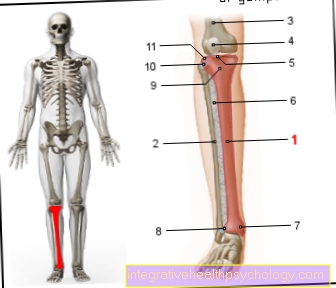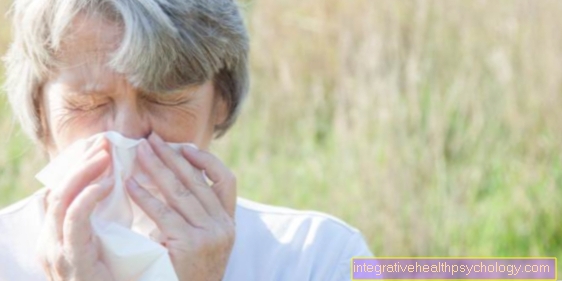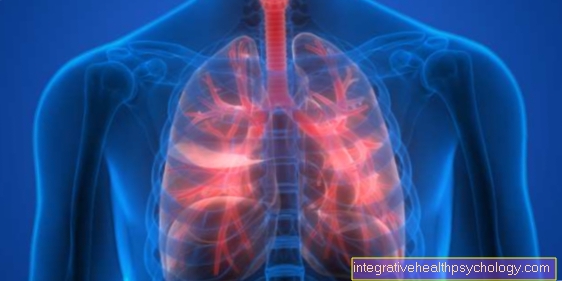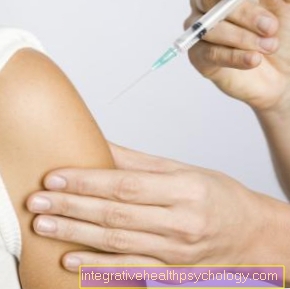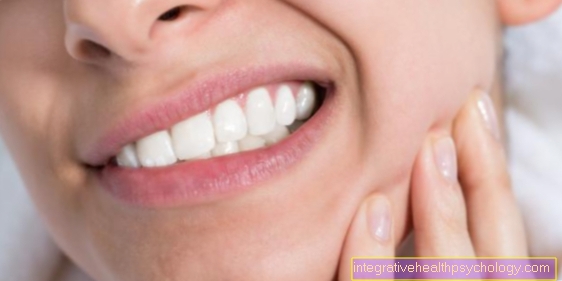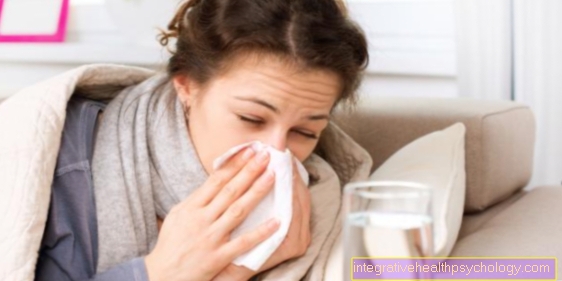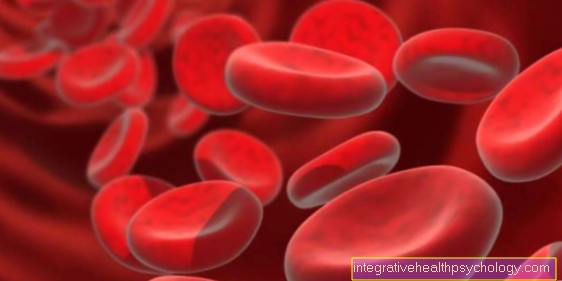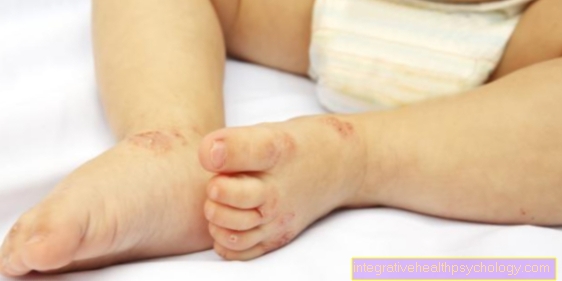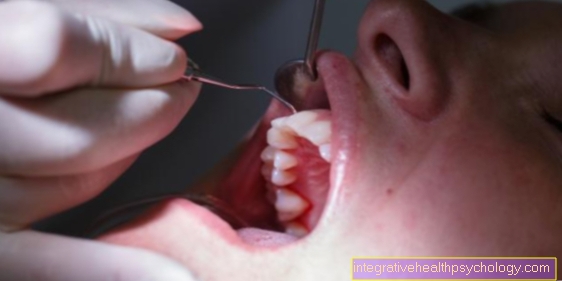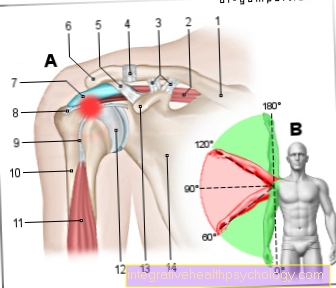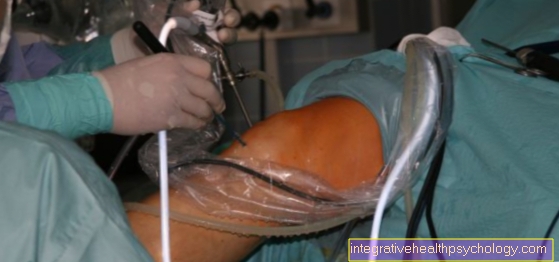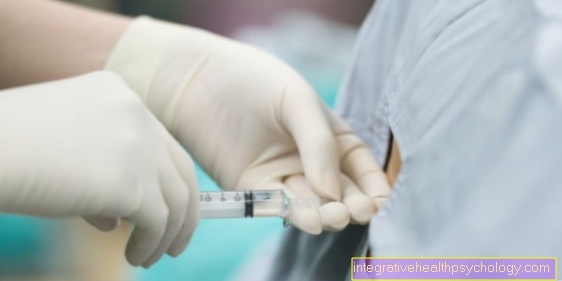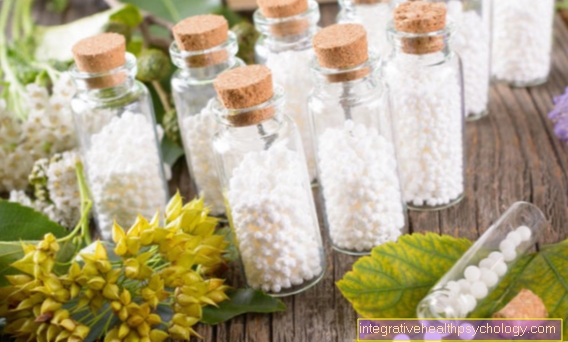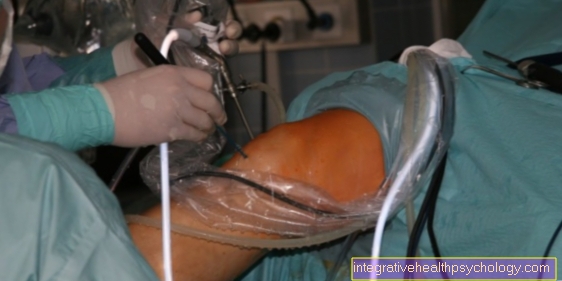Swelling after a mosquito bite
introduction
Anyone who has been bitten by a mosquito usually only recognizes this some time after the mosquito has struck.
Usually a slightly reddened and swollen area is noticeable, which is also itchy.
The whole thing is triggered by the fact that the mosquito not only sucks blood when it bites, but also puts some of its saliva under the skin. This ensures that the blood is thinned, which makes it easier for her to suckle blood.
The body then starts a defense reaction, which causes the swelling.

Why does swelling occur after a mosquito bite?
A small wheal can be noticed immediately after a mosquito bite.
This is caused by the saliva that the mosquito gives under the skin when it bites to thin the blood.
A short time later, the body begins to attack this exogenous substance.
To do this, immune cells are first brought to the bite, which locate, recognize and attack the foreign substance.
Once the body has recognized the substance, more specific cells can be sent to the sting.
They are better "trained" on the mosquito's saliva and can get it out of the way as quickly as possible.
Fluid is needed to transport the immune cells to the sting.
The cells initially swim in the blood vessels and then emerge in the fluid from the vessels into the tissue.
The swelling is usually caused by this extra fluid that is needed for cell transport.
In addition, there is a local defense reaction that attracts further defense cells.
In order to neutralize the substances contained in the saliva, the sting heats up. Typically, this also leads to itching, and the inflammation also expands the swelling.
A particularly strong swelling occurs with a mosquito bite when the immune system reacts excessively as in an allergic reaction.
Then there is a real influx of cells and fluids.
Also read the article on the topic: Lymphangitis after an insect bite
What does an extremely strong swelling after a mosquito bite indicate?
Extremely severe swelling after a mosquito bite can have two causes:
- One possible cause is an allergic reaction to mosquito saliva.
In this case, the immune system releases other substances in addition to its normal defense cells. These in turn attract additional cells to the area of the bite, which leads to the extremely severe swelling.
Read more about this at: Allergic reaction to a mosquito bite
- The other trigger for such excessive swelling is infection of the sting.
This comes about, for example, because the mosquito itself is colonized by bacteria.
When the sting occurs, the bacteria get under the skin together with the saliva.
The body then not only has to defend itself against the foreign substances from the saliva, but also against potentially dangerous bacteria and therefore increases the number of cells that are washed ashore as a defense.
Also, if there is a bacterial infection, there is usually inflammation around the bite. This is accompanied by redness and swelling.
Read more about this: Inflamed insect bite - what to do and when is it dangerous?
How do I recognize an allergy after a mosquito bite?
An allergy after a mosquito bite usually only manifests itself through local symptoms.
This leads to severe itching and significant swelling of the sting.
The swelling can sometimes even be the size of a hand if you have an allergic reaction.
Overheating of the sting and reddening are possible as the body tries to fight the foreign substances with an inflammatory reaction.
Unlike with many other insect bites, there is usually no allergic reaction of the entire body, which can sometimes even be accompanied by shortness of breath and can be life-threatening.
More information on this topic:
- Allergic reaction to a mosquito bite
- How do you recognize an allergy to a mosquito bite?
How do I recognize an infection after a mosquito bite?
An infection after a mosquito bite is usually triggered by bacteria that have infected the mosquito.
As other potential pathogens have entered the body in addition to saliva, there is an intensified immune reaction.
The sting swells, becomes red and warm; in addition to itching, the sting can also cause pain.
With this inflammatory reaction, the body tries to fight the germs before they can spread.
How do I recognize blood poisoning after a mosquito bite?
Blood poisoning (sepsis) after a mosquito bite usually occurs as a result of an infection.
Therefore, there is initially a local inflammatory reaction
- Redness,
- Swelling,
- Overheating and
- Pain.
Then the inflammation spreads throughout the body, so that
- Fever,
- Chills as well
- Circulatory weakness can occur.
Sometimes the redness from the sting migrates down the body.
This also indicates sepsis.
How to recognize blood poisoning: Symptoms of blood poisoning
What is the best way to treat the swelling?
The swelling after a mosquito bite is best treated by cooling.
A cold pack or an ice pack is usually sufficient for this.
In addition, ointments such as Fenistil® can be applied to the sting.
This has a cooling effect on the one hand and anti-inflammatory on the other.
It also contains substances that reduce an allergic reaction in the body.
This not only reduces the swelling, it also minimizes pain, itching and redness.
Common methods, such as briefly pressing something warm on the area immediately after the stitch, can also help.
This brief heat destroys proteins contained in mosquito saliva.
So the body has to do less defensive work.
Home remedies to curb this inflammation can be very helpful, especially when the mosquito bite becomes infected.
Find out more about this: Home remedies for mosquito bites
Home remedies for the swelling
Home remedies can counteract swelling after a mosquito bite in two ways.
- On the one hand, cooling wraps such as quark or cabbage rolls can be used. These have a pain-relieving effect and reduce itching and swelling.
- Anti-inflammatory home remedies, such as poultices with cooked ginger or apple cider vinegar, also reduce swelling by reducing the body's immune response.
Please also read: Home remedies for mosquito bites
Duration of the swelling
Usually the swelling after a mosquito bite is short-lived.
Such a sting will heal after about three to four days.
The duration of the swelling can only be prolonged by scratching or an increased immune reaction (inflammation, infection, allergy).
However, even under these circumstances, it should be gone after about a week.
You might also be interested in: Duration of swelling from a bee sting.
Concomitant symptoms
In addition to swelling, mosquito bites typically experience itching.
Most of the time, the puncture site is also slightly reddened, more rarely overheated.
If the mosquito bite is also infected, these symptoms can worsen.
An allergy also leads to a more pronounced expression of these complaints.
If pathogens are also transmitted by the mosquito, a generalized immune reaction of the body occurs.
This is usually expressed by:
- Fever,
- more rarely also chills,
- Malaise and
- a headache
If blood poisoning occurs as part of this infection, the circulation can also be affected, which manifests itself in the form of dizziness and even fainting.
In the worst case, this can even attack individual organs, which in turn leads to life-threatening disease states. However, this is extremely rare.
You might also be interested in this topic: Lymph node swelling after an insect bite
When should I see a doctor for the swelling?
If the swelling after a mosquito bite suggests a more serious illness, a doctor should be seen.
For example, if the swelling is so large that the function of the affected part of the body is restricted, it is advisable to see a doctor.
If the sting becomes infected and, for example, the first signs of blood poisoning or the transmission of dangerous pathogens appear (fever, chills, general feeling of weakness), you should be examined by a doctor.
Recommendations from the editorial team
You might also be interested in:
- Inflammation after a mosquito bite
- Immediate action in the event of an insect bite
- Allergic reaction to a mosquito bite
- Mosquito repellent
- You can recognize a bite from the Asian tiger mosquito by these symptoms



